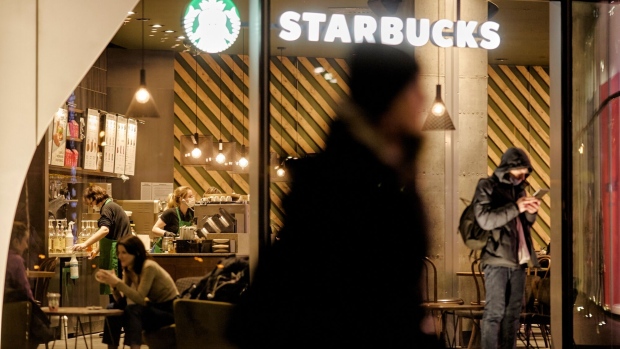Sep 28, 2023
Starbucks Illegally Kept Wages, Benefits From Union Workers
, Bloomberg News

(Bloomberg Law) -- Starbucks Corp. broke federal labor law when it boosted wages and benefits only for workers in non-unionized stores across the US last year, a National Labor Relations Board judge held.
Thursday’s decision from Administrative Law Judge Mara-Louise Anzalone marks the first nationwide ruling against the coffee giant amid its resistance to a unionization wave that began two years ago. Starbucks violated the National Labor Relations Act in August 2022 by lifting wages to at least $15 an hour and providing benefits such as credit card tipping, increased training, and faster sick time accrual to all stores that weren’t unionized, the judge said.
Starbucks CEO Howard Schultz announced the policy changes six months after workers began organizing with Starbucks Workers United, according to the decision.
“Respondent used its top executive to launch a corporate-wide effort to manipulate its employees’ free choice by conditioning their pay and benefits on their willingness to forgo organizing—a direct attack on the Act’s central goals,” the judge said.
Anzalone ordered Starbucks to compensate thousands of unionized workers for the wages and benefits they were unlawfully denied, in the most expansive ruling against the coffee giant to date.
The 45-page decision is the latest of more than a dozen ALJ rulings to go against Starbucks. But it’s the first one to find the company broke the law on a nationwide scale, instead of on a store-by-store basis.
The Starbucks unionization campaign has resulted in nearly 350 organized cafes in 37 states. NLRB lawyers have lodged almost 100 complaints against the company for its response—at least 75 of those complaints are pending before the agency’s ALJs.
SBWU said in a statement Thursday evening that the decision is a “massive victory for Starbucks workers”.
“It shows that Starbucks’ anti-union campaign started from the top, was coordinated, and has deprived thousands of workers who live paycheck-to-paycheck income that could be put toward food, bills, sick benefits and more,” the union said.
Starbucks has denied all legal wrongdoing in public statements and to labor board officials. It argued before the judge that giving the pay raises to unionized baristas would have been illegal because federal law prohibits the company from making unilateral changes to union workers’ jobs.
But Anzalone concluded this argument wasn’t lodged in good faith, and would require her to presume that Starbucks and its attorneys “so misapprehended basic labor law concepts that it considered itself compelled to deny wage and benefit increases on the basis of employees’ union activities,” she wrote in the decision.
Anzalone held Thursday that the company illegally discriminated against thousands of union workers by withholding the increased benefits, and that by doing so it deterred others from joining the organizing effort.
The judge declined to order Starbucks to have managers go through training on the NLRA and to extend the certification year for all unionized stores, as was requested by NLRB attorneys.
She did, however, order CEO Laxman Narasimhan to read a notice of employee rights to US workers and post the notice in every store.
In a blog post to its website, Starbucks said it plans to appeal the ruling to the full board and maintained it followed the law.
“The ALJ’s recommendation that Starbucks could or should have disregarded these rules is flatly wrong and creates an untenable situation—which has already been rejected by federal courts—where employers violate the law if they unilaterally include organizing or unionized employees when making changes in wages and benefits and violate the law if they do not do so,” the company said.
The case is Starbucks Corp., N.L.R.B. A.L.J., Case 19-CA-294579, 9/28/23.
To contact the reporter on this story: Parker Purifoy in Washington at ppurifoy@bloombergindustry.com
To contact the editor responsible for this story: Laura D. Francis at lfrancis@bloomberglaw.com; Rebekah Mintzer at rmintzer@bloombergindustry.com
(Updated with comments from Starbucks and the union. Story originally published Sept. 28.)
©2023 Bloomberg L.P.






